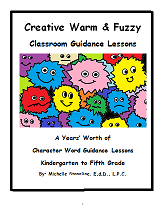Trauma Issues in the Brain 101
If you have a child who is born to someone who has family trauma it can be passed down biologically to the child. Parents of generational trauma have a difficult time parenting their children if they have had trauma.
Trauma goes beyond parenting classes. This is why we are seeing an increase in
children being caught up with the department of family services system. We are not handling trauma issues appropriately.
Parents who have trauma need understanding about what is trauma and how trauma impacts a child forever. Parents need to understand and identify their own trauma. Parents need to understand that trauma is multigenerational and traditional parenting classes do not work on trauma.
Protective factors of trauma shield children from trauma. These protective factors prevent trauma from happening in the first place. Resilience is used when bad things have happened and a family it needs to be rebuilt from trauma.
New Updated Information on the Brain: The brain is not fully developed until 26 for women and 30 for men. Before we thought it was fully developed at 25 years old.
1. Teach clients who suffer from trauma how to trust their body signals. How do you teach someone to self-regulate. When my body is running high how do I self-regulate my trauma. Your heart rate has changed, you’re breathing, and you get clammy, or feel sick. We need to be aware of what trauma is.
Trauma is not that you are bad, but that bad things have happened to you.
2. Trauma reminders are the reenacting event. Trauma triggers can also be a smell, a sound, a person, or visual triggers. Complex trauma is the event that keeps happening to you.
3. Toxic stress is bad stress with no breaks in-between. Tolerable stress is stress with a support system. Healthy stress is situational and is good stress.
4. Psychological safety is a nurturing healthy environment and system that protects children from trauma. Families need to be enhanced and have more psycho education to birth families, therefore they can make changes within the entire family system.
5. Enhance the well-being and resilience of the mental health professional workers for exposure to secondary trauma.
6. Trauma Screenings- additional tool that is a brief inquiry that screens and assess how much trauma the child or the family experiences: Child and Adolescent needs and Strengths Assessment (CANS). These are tools for assessing trauma.
ANSA- Adult Needs and Strength Assessment Trauma Screening
A.C.E.S. (Adverse Childhood Experiences Survey)
A ten question survey that Kaiser Permente started and it was a long term study on the effects of trauma. The higher your ACE score the more at risk you are for lifetime risks such as physical and mental health disorder. Mental Health Professionals should take the A.C.E.S. Assessment to see how trauma may affect their life.
With trauma you have difficulty multi-tasking. This is why people with trauma have a hard time getting to work and keeping a job. People of trauma feel overwhelmed easily. Perhaps this is why there is such an increase in A.D.H.D. diagnosis.
Resiliency from Trauma: Prepare for disruption, adapt and grow, rebound, bounce back and cope effectively in the face of difficulties. Teach how to deal with stress, be able to recover and maintain equilibrium after trauma.
The science of resilience helps to teach children to deal with trauma. Each child experiences different trauma. Resiliency is built over time to help with trauma. We promote this in children to help them beat the odds of trauma and grow up.
“The world breaks everyone and afterwards many are strong at the broken places.” Ernest Hemmingway.
Final Thoughts on Trauma
1 Set up Protective Factors for clients to help avoid trauma in the first place.
2. Alleviate Stressors as many as possible to help deal with trauma issues.
3. Stress Management, Concrete Skills, and Assess trauma.
4. Supportive Relationships are the key to resiliency. Increase peer relationships and bonding. This is a skill that must be taught to help trauma issues.
5. Learn the rules of the game and set clear boundaries about the rule set. Teach life skills that will become part of the protective factors to avoid future trauma.
6. Provide care and support within the “village”. Trauma victims, especially children, need to know they are cared about. This is the key piece to being resilient from trauma.
7. With the trauma affected person you need to set high expectations, but only with their permission. Offer choices so they can make better decisions and allow for buy in for trauma dealings.
Mental Health Professionals need to provide these to help trauma victims:
Safety- Free from fear and feels that they are out of psychological and physical harm with trauma. A safe person to talk to is very important. Sometimes all it takes is one safe person to help deal with trauma.
Stability- The degree of predictability of a person’s environment and the routine of your life helps trauma victims. Having consistency within your own life is important to heal trauma wounds.
Nurturing- The extent to which an adult is available and respond with care and sensitivity to a child’s needs.
Notes taken from Ms. Ross's Trauma 201 workshop.
Disclaimer: This website and its content is intended for trained licensed mental health professionals and school certified mental health professionals to use for their clients / students at their own discretion.
*If you ignore the disclaimer above are using these techniques on yourself and you feel any discomfort or upset it is highly suggested that you seek out a licensed mental health professional immediately.
"Beyond Art Therapy" is the concept from Dr. Stangline that combines all creative fields in therapy. It is not the traditional "art therapy" but goes beyond to include sand tray therapy, play therapy, mindfulness, meditation, color therapy, cognitive behavioral therapy, and a vast majority of other therapies.
For any other type of mental health emergency call your local 911 / Police Number immediately.
Dr. Stangline does not offer advice / suggestions to anyone who is not a professional mental health provider, or a student who is studying this field and has questions about mental health programs of study.
See our Exciting Selection of eBooks:
Award Winning:
Creative Counseling 101 eBook
Our Best Seller!
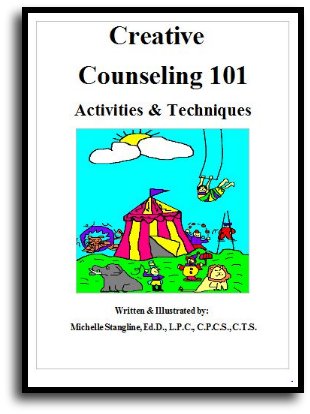
Step By Step Therapy:
Learn how to be a more Creative Therapist with the Book that started it all!
- Graduate School Counseling book used by hundreds of graduate counseling students!
- Includes full color reproducible worksheets with most activities.
- Winner of the Counselor Writer of the Year Award, 2011, Georgia Regional Award
Download Your Copy Today Only $39.95:
See Creative Counseling 101 eBook Information Here:
Get the Set
of all four
eBooks for only $98.95:
An incredible collection of how to do therapy eBooks!
A $159.80 Value,
You Save Over $60!
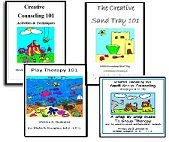
Get your complete set of the Creative Counseling 101.com eBooks by Dr. Michelle Stangline for only $98.95, that's less than $25.00 per eBook (Regular Price is $39.95 for each eBook.).
Your complete set includes:
- Creative Counseling 101
- Creative Group Counseling 101
- Creative Play Therapy 101
- Creative Sand Tray 101
For more information click the link below:
See Complete Set of eBooks For Sale Here:
New!!! "Beyond Art Therapy" 101 eBook
Over 300 pages of Beyond Art Therapy activities and techniques. Learn what I teach graduate counseling students!
See the link below for more information.
Only $39.95
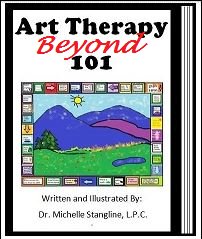
See More Invividual eBooks For Sale:
Sand Tray Therapy 101 eBook:
Learn how to do Sand Tray Therapy or enhance your skills.
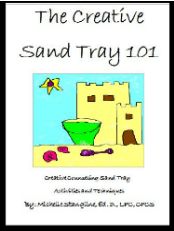
Play Therapy 101 eBook
Learn how to do play therapy or enhance your skills.
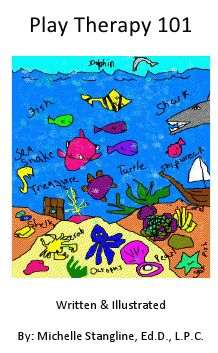
Small Group Counseling eBook For Sale:
Learn how to do creative group therapy and enhance your skills.
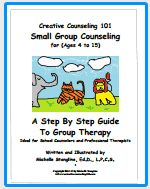
School Counselor Guidance Lesson & Social Stories eBook for sale:
Get a year's worth of school counselor guidance lessons with "Creative Warm & Fuzzy Classroom Guidance Lessons eBook". Introduce your students to the "Warm & Fuzzy Way". Click the link below for more information:
Warm & Fuzzy School Counselor Guidance Lessons eBook
